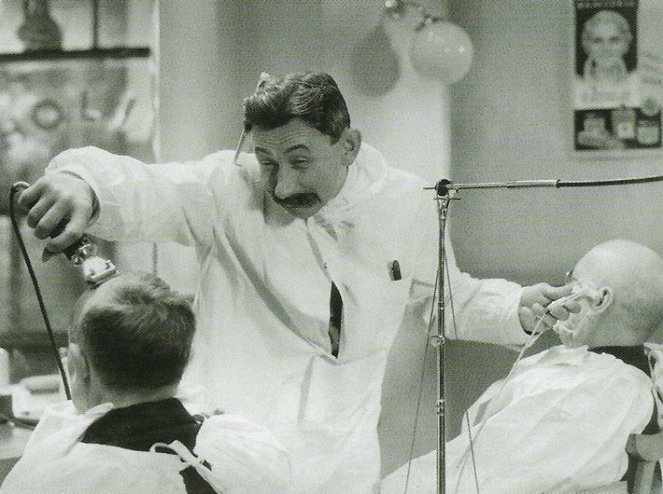Drehbuch:
Karel LamačKamera:
Antoni WawrzyniakMusik:
Władysław DanBesetzung:
Vlasta Burian, Adolf Dymsza, Zula Pogorzelska, Wanda Jarszewska, Wiktor Biegański, Stanisław Belski, Eugeniusz Koszutski, Aniela Miszczykówna (mehr)Inhalte(1)
Žižkov barber Ferdinand Šuplátko is surprised by news of an inheritance that he has been left by his aunt in Warsaw. He leaves for Warsaw but is extremely disappointed. All that is left in her empty flat are twelve antique armchairs and a painting of the dead aunt. A Warsaw antiques dealer is willing to buy them from him. Šuplátko takes them all away at once, piled up into a pyramid. He does not notice that one of them has got caught on the gates of an orphanage and remains hanging there. After he returns home he finds a letter behind the painting in which his aunt informs him that one hundred thousand dollars have been sewn into the upholstery of one of the chairs. Šuplátko rushes back to the antique shop but the chairs have already been sold. Šuplátko arranges with the antiques dealer that they will look for the chairs and then split the profits. After various adventures they eventually find the armchairs but not the money. The disappointed men walk past the orphanage which is celebrating Orphan Day. Both men listen dumbfounded to a speech given by the director: she thanks the anonymous donor for giving these abandoned children one hundred thousand dollars which had been found hidden in the lining of the upholstery. (Verleiher-Text)
(mehr)Kritiken (3)
Die erste polnisch-tschechoslowakische Koproduktion war gleichzeitig die erste Verfilmung eines klassischen Textes von Ilf und Petrov, den Karel Lamač für den Film bearbeitete. Allein bis 1945 wurden 6 weitere Versionen gedreht, darunter 13 Stühle (1938) mit Heinz Rühmann und Hans Moser in den Hauptrollen. Im tschechoslowakisch-polnischen Umfeld fiel das Thema Vlasta Burian und Adolf Dymsza zu. Formal handelt es sich eher um eine Tongroteske, die im damaligen Kontext des tschechoslowakischen Films einzigartig ist. Die Tradition der Partnerschaft mit dem polnischen Kino hält bis heute an.
()
Diesen Film gibt es heute nur in einer unvollständigen Version. Es fehlt aber nicht viel und der fehlende Rest würde ihn wahrscheinlich nicht verbessern. In den besten Momenten erinnert er an einen stummen Slapstick, in dem hier und da ausversehen etwas gesagt wird. Sonst ist der Film aber nicht besonders gut. Vlasta Burian und Adolf Dymsza sind ein sehr seltsames und ungleiches komisches Duo (raten Sie mal, wer besser ist). Sie verstehen sich nicht, wenn sie nicht gerade eine erfundene Sprache benutzen, und ich habe sie auch nicht verstanden.
()
Such a nice nonsense with Vlasta Burian, who takes advantage of the fact that the story takes place in Poland. The best scene for me was definitely at the beginning, where Ferdinand meets Wladislaw and they are unable to communicate until they start whistling at each other, that really got me. A clever joke that doesn't come around often. Otherwise, it's quite a nice grotesque that sometimes goes a bit over the top.
()

